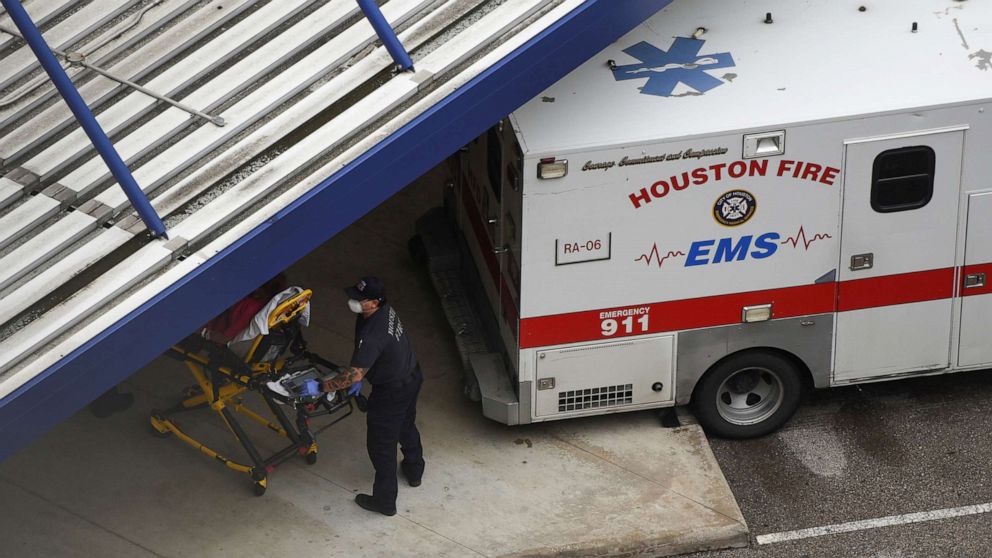


The recent jump in coronavirus cases in locations such as Texas and Florida has pitted state and local leaders against each other over safety measures.
Despite surging daily numbers of cases in those states, Texas Gov. Greg Abbott and Florida Gov. Ron DeSantis, both Republicans, have long refused to mandate proven health actions such as face coverings and reduction of crowds. Their actions have prompted city leaders, such as the Democratic mayors of Austin and Tampa, Florida, to take matters into their own hands.
Abbott changed his stance Friday when he ordered the state's bars to close and gave the OK to local leaders to limit crowds to 100 people as the state’s COVID-19 positivity rate (percentage of people testing positive) increased to 12.7% as of Saturday. DeSantis also ordered the state's bars to close for in-person activity. Abbott's office didn't immediately respond for comment.
MORE: Florida sets new record of COVID-19 cases with over 4,000 moreKathy Cramer, a professor of political science at the University of Wisconsin-Madison, said the lack of consistency from the elected officials will only make things worse.
“Now it’s become partisan football, it’s becoming confusing to people,” she told ABC News. “I think people are throwing up their hands and saying I don’t know what to do and I’m just doing what’s right for my family. That could mean taking this pandemic more seriously or being complete lax based on their preferences.”
Cramer also warned the pandemic’s trends are not validating the governors' actions, and if they don’t get on board with what their local leaders are pleading, it could damage their political influence for years to come.
Since it reopened on May 1, Texas has seen 102,688 new coronavirus cases, which averages 1833.7 new cases a day, according to the Texas Health Department. During the last three weeks, the state has seen a record number of daily new cases.
In Florida, there have been 74,285 new cases since the state reopened on May 5, averaging 1,456 new cases a day, according to Florida’s Health Department. The state has recorded a record number of daily new cases over the last two weeks, such as the over 8,000 new cases on June 26.
The state’s health department data has come under scrutiny following allegations from a former employee who contends she was forced to under-report the numbers, a matter DeSantis dismissed as a "non-issue" in May.
Despite rising numbers, Abbott and DeSantis didn’t initially heed calls from health officials and city leaders to enforce safety measures.
Abbott told Texans on June 16 “there is no reason right now to be alarmed." He also declined requests that day from a group of the state’s mayors to amend his executive order and give them the power to mandate face coverings.
Some of those mayors, however, pushed forward and urged their residents to wear face coverings. A county judge in San Antonio issued an order that mandated them but didn’t issue any fines.
Austin Mayor Steve Adler expressed frustration with governor’s policies during an interview with ABC News June 23.
“People in the community here are getting conflicting messages on that,” he told ABC News. “Here at the state, the governor continues to say it's important, but for the longest time, we were unable to enforce it.”
DeSantis also said he was against a face-covering mandate for the state, contending that people would heed the health recommendations and do it on their own.
“We've advised that it's something that could make an impact...(but) to put criminal penalties on that is something that would probably backfire." he said in a news conference June 26, the day the state recorded 8,943 new cases.
Leaders of some Florida cities, however, disagreed and superseded DeSantis by issuing executive orders that mandated face coverings. Tampa mayor Jane Castor, who issued a mandate on June 22, said the data proved that few cases develop with more people wearing a face covering.
“Our community is looking for leadership which is why we are putting this mandatory mask ordinance in effect to protect our citizens. If we wait, more people will get sick and more lives will be lost,” she said in a statement.
Palm County, Florida's health department also issued a mandatory face covering order last week.
Cody McCloud, apokesman for DeSantis's office, told ABC News Friday that the governor hasn't pre-empted any local governments from enacting their own COVID-19 health orders.
"Governor DeSantis is supportive of local leadership as they are uniquely poised to understand the needs of their communities,"
Cramer said divisions between local leaders and governors are nothing new, but the coronavirus has emboldened the municipalities to counter the top-down power structure.
MORE: A tale of two pandemics: How coronavirus split the map of the US“If these municipalities prove that they know better, it may mean a weakening of state power,” she said.
Randy Erben, an adjunct professor at the University Texas School of Law and former legislative director for Abbott, said the jump in cases is making local and state leaders find a common ground.
He noted that Abbott has changed his position on COVID-19 safeguards as the data has shown a jump in cases and has been pushing residents to wear masks and take other precautions, even if his office didn’t mandate it.
“I think people are smart,” Erben told ABC News. “They listen to their experts they listen to the pol experts and they’ll do what they have to do.”
Cramer said depending on how bad the pandemic gets in certain states, governors could face a reckoning, especially if local municipalities’ actions prove to save more lives than their executive orders
“I’m not exactly sure what it will do for policy but it will be a wakeup call for higher-level partisan leaders. They’ll have to say, ‘We need to be better listeners to our local leaders and residents,’” she said.